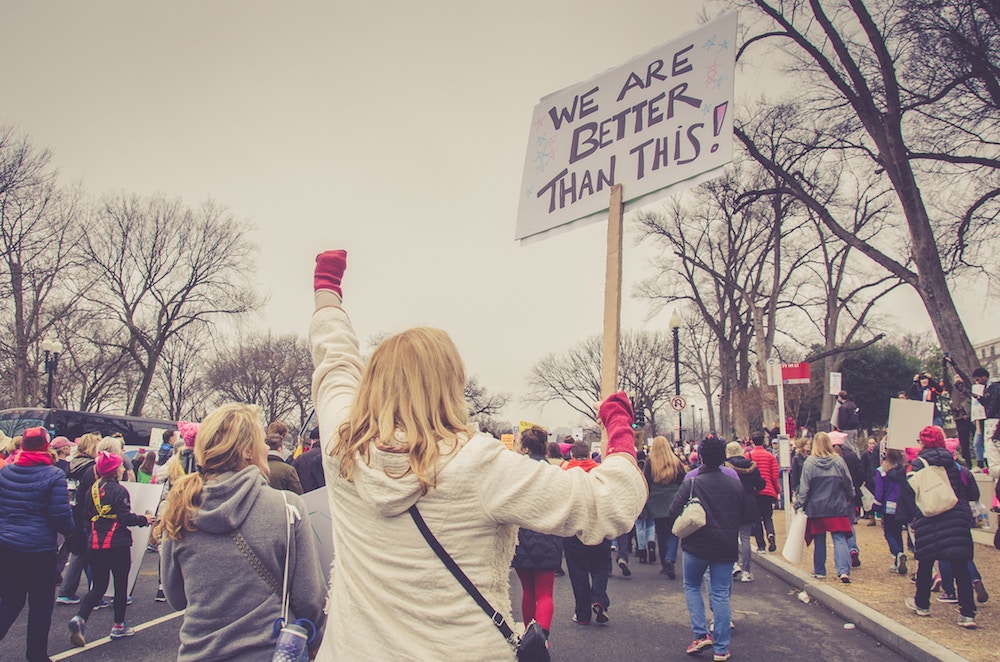From charity fun-runs, to slogan t-shirts and protests, are we only doing ‘good’ things to make ourselves look virtuous?
Since the middle of 2016, there’s been a new buzzword making headlines and edging its way into debates. “Virtue signalling” is a term used to describe the act of showing support or doing something “virtuous” because it makes you look good to your peers, rather than because you truly believe in it.
It’s true that over the last few years, politics has been creeping into all aspects of culture. The values we present to others help build our identities. You can see it in the films we watch, the places we go, and the clothes we wear. Dior’s Spring 2017 collection brought us the “We should all be feminists” slogan T-shirt (which you can buy for a cool £490). And, whereas a few years ago acceptance speeches would normally be full of emotional “thank yous”, 2018’s award season has been dominated by the rallying #MeToo and #TimesUp campaigns.

Google search trends can tell us a lot about culture and worldwide conversations, and the term “virtue signalling” peaked dramatically on the 29 January 2017. What’s relevant about that date? It was the day when US federal judges blocked Executive Order 13769, commonly known as Donald Trump’s Travel Ban.
The Travel Ban sparked mass protest in airports across the US. Here in the UK, the response was similar. Speaker of the House of Commons, John Bercow, voiced a preference to prevent Donald Trump from addressing the House of Commons, and the condemnation continued online from MPs and the public alike. Throughout it all, there was one phrase dominating the think-pieces and online debates: “virtue signalling”.
We’d like to hope that people are genuine and they’re speaking up because they care about the cause. But if the trends tell us anything, it’s that as there has been a rise in the number of people engaging with politics and social justice, others become increasingly sceptical of their motives.
However, although we now have a nifty phrase to describe it, “virtue signalling” isn’t an entirely new notion. “The behaviour behind ‘virtue signalling’ has been going on ever since society put a value on doing good for others,” says Rachel Coffey, a qualified life coach. “What has shifted significantly in recent years though, is the ease with which your ‘average person’ can share what they think or do with an audience.”

So, “virtue signalling” does happen from time to time. But, when it does, who is it actually hurting? “The odd bout of ‘virtue signalling’ in itself is probably pretty harmless,” says Rachel. “It’s part of human nature, and charities have probably done fairly well thanks to this flaw in our personalities – we all know someone who has ended up doing a 5k fun-run because they think it looked good.”
But, there’s little ful lment to be found in pretending to be something that we’re not. For Rachel, the point at which “virtue signalling” does become harmful is when people become addicted to a cycle of image- crafting and promoting themselves in a way that isn’t true, just to get a reaction.
While we can’t truly know the real intentions of others, the conversation on “virtue signalling” offers an opportunity to assess whether or not we as individuals live authentic lives, and are being true to ourselves.
“We all need to feel comfortable in our own skin,” says Rachel. “Living an authentic life allows us to have a clarity of thought, confidence to pursue our dreams and build strong relationships with others. This is because we know who we are and what we need to make us happy.”
So, how do we make sure that we’re being authentic to our true selves? Rachel believes the key is to be honest with ourselves. “Share things with others that we genuinely believe in and enjoy – don’t get too swept up in what we think others think of us,” Rachel adds. “If in doubt, ask yourself what the purpose of doing something is. If it’s for attention or admiration, leave it out and spend the time on something you think is really valuable instead.”


Comments